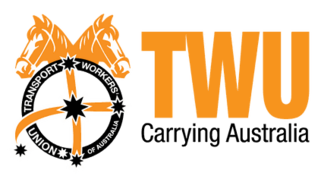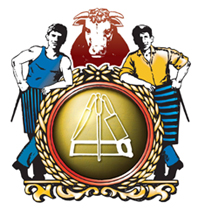Structure
The AMIEU has branches representing workers each State and Territory of Australia. Branch officials are democratically elected by the members every four years.
The union also has a Federal Council, which represents the union nationally and is the supreme decision making body of the union. The Council is composed of elected delegates from each branch, who meet every two years to determine policy for the union and elect the Federal Secretary and President.
In between the biannual meetings of the Council the union is governed by a Federal Executive made up of the secretaries of each branch as well as the Federal Secretary and President.
The union is affiliated with the IUF, the Australian Council of Trade Unions, and the Australian Labor Party.
History
Early history
Prior to 1890 there were no organised trade unions in the Australian meat processing industry. Wages and conditions varied from worksite to worksite and were re-negotiated at the start of each killing season by butchers on behalf of their teams. Wages tended to be higher at the start of the season when cattle were plentiful, but then driven down significantly at the end of the season when cattle were scarce. [2]
The AMIEU was formed in 1906 as the Federated Butchers Union, and changed its name to the Australasian Meat Industry Employees Union in 1912.
The AMIEU was organised between 1906 and 1920, particularly in Queensland, by the revolutionary union the Industrial Workers of the World. The IWW, or Wobblies, encouraged Meatworkers to set up boards of control on job sites. These boards functioned, effectively, as works councils in the Meat industry. The boards were particularly strong in North Queensland where, under the direction of state organiser Walter Russell Crampton, [3] they controlled production levels through direct action. Meat industry sheds in North Queensland were so effectively organised that the sheds became closed shops. This was known in the day as Preference of Employment. [4]
The AMEIU used the skilled portion of the workforce, the slaughtering gang, to infiltrate non-union towns in North Queensland. These towns were essentially company towns. The slaughtering gang was irreplaceable due to their skill, they were mobile as their skill was in demand across multiple shops, and they were militant. The AMIEU considered itself an industrial union and enrolled all workers in a particular workplace regardless of their trade—the meatworkers represented boilermakers, engine drivers and maintenance workers who worked in the meat industry.
The Queensland organising techniques spread to southern states. Shop committees (workers councils) were established at the Melbourne and Corio works in Victoria in 1917, on the initiative of C. Coupe. Coupe believed shop committees would, "ultimately form part of the machinery of government for the workers when they are prepared to take control of the industries, to be run in the interests of the working class." [5]
In South Australia councils were also established, and in 1919 the South Australian branch of the AMIEU reported to the federal council, "No dispute along the old lines of a cessation of work has taken place within the past two years. Job control and scientific organisation has rendered obsolete this medieval method of fighting. The arbitration method of securing our rights has often been discussed, and has been submitted to most adverse criticism; and, so far as this branch is concerned, unless the whole aim and present methods of the arbitration system are speedily altered, we will have none of it." [6]
The councils actively organised go-slows and sabotage, as replacements for strike action. Revolutionary unionism is unusual in Australian history, and the 1908–1923 period was particularly militant. In the same period the AMIEU was organising workers councils; the IWW was organising general strikes, forgery scandals and arson attacks in New South Wales to prevent continued Australian involvement in the First World War, and to protect workers rights. The IWW was a large force behind these upheavals in NSW, and when the IWW was persecuted nationally after 1916, the AMIEU supported them.
Recent history
IN 1983, the AMIEU was involved in a major industrial dispute at the Mudginberri abattoir in the Northern Territory. The AMIEU served a log of claims on Mudginberri and on all other abattoirs in the Northern Territory, seeking a unit tally system to be set up. Mudginberri chose to fight the claim, with the backing of the National Farmers' Federation.
The AMIEU has supported a ban on live animal exports since the 2018 animal rights controversy in the Australian live exports industry, and has called for live exports to be replaced by an expanded chilled meat trade. [7]

The Industrial Workers of the World (IWW), whose members are nicknamed "Wobblies", is an international labor union founded in Chicago in 1905. The nickname's origin is uncertain. Its ideology combines general unionism with industrial unionism, as it is a general union, subdivided between the various industries which employ its members. The philosophy and tactics of the IWW are described as "revolutionary industrial unionism", with ties to socialist, syndicalist, and anarchist labor movements.
Industrial unionism is a trade union organising method through which all workers in the same industry are organized into the same union, regardless of skill or trade, thus giving workers in one industry, or in all industries, more leverage in bargaining and in strike situations.

The Australian Council of Trade Unions (ACTU), originally the Australasian Council of Trade Unions, is the largest peak body representing workers in Australia. It is a national trade union centre of 46 affiliated unions and eight trades and labour councils. The ACTU is a member of the International Trade Union Confederation.

The Shop, Distributive and Allied Employees' Association (SDA) is the largest private sector trade union in Australia, representing retail, fast-food and warehousing workers, and has branches in every state and territory. Its membership is predominantly in casual and insecure employment within the retail and fast food sectors. The union also represents a significant membership of workers from culturally and linguistically diverse backgrounds.
The Australian labour movement began in the early 19th century and since the late 19th century has included industrial and political wings. Trade unions in Australia may be organised on the basis of craft unionism, general unionism, or industrial unionism. Almost all unions in Australia are affiliated with the Australian Council of Trade Unions (ACTU), many of which have undergone a significant process of amalgamations, especially in the late 1980s and early 1990s. The leadership and membership of unions hold and have at other times held a wide range of political views, including socialist, democratic and right-wing views.
The Australian Workers' Union (AWU) is one of Australia's largest and oldest trade unions. It traces its origins to unions founded in the pastoral and mining industries in the late 1880s and it currently has approximately 80,000 members. It has exercised an outsized influence on the Australian Trade Union movement and on the Australian Labor Party throughout its history.

The Queensland Council of Unions (QCU) is a representative, an advocacy group, or peak body, of Queensland trade union organisations, also known as a labour council, in the Queensland, Australia. As of 2020, 26 unions and 13 regional branches were affiliated with the QCU. The QCU represents unions covering around 350,000 Queensland workers. It is affiliated with the Australian Council of Trade Unions (ACTU). Its offices are located in the suburb of South Brisbane, Queensland. As a peak body for the Queensland trade unions, the objective of the QCU is to achieve industrial, social and political justice for Queensland workers. The management structure of the QCU is made up of a committee of management and an executive of representatives comprised from affiliated unions.

The Transport Workers' Union of Australia (TWU) is a trade union with members throughout Australia. It has 5 main branches based in: Australian Capital Territory/New South Wales; Queensland; Victoria/Tasmania; South Australia/Northern Territory; and Western Australia.
The Mudginberri abattoir was the focus of a major industrial relations dispute from 1983 to 1985 in Australia's Northern Territory which was notable for being the first successful use of legal sanctions against a union since the gaoling of Victorian Tramways union leader Clarrie O'Shea in 1969. The successful prosecution of the Australasian Meat Industry Employees Union (AMIEU) under section 45D of the Trade Practices Act was seen by the National Farmers Federation and the developing New Right in and outside the Liberal Party of Australia as a breakthrough in a campaign to break the power of the unions and introduce contract employment.
The Court of Arbitration was the first court in New South Wales, a state of Australia which dealt exclusively with industrial relation disputes in the early twentieth century. Justice Lance Wright claims that it perhaps was the first court of its type in the world. The court was unique at that time as it was the first court of its type to deal with labour relations between employer and employees on a compulsory basis. Previous arbitration measures between employer and employee had been on a voluntary basis or had been based on the criminal justice system through the use of criminal penalties. The conventional economic model is that both employer and employee enjoy equal bargaining power to set wages and conditions. This asserts that both parties are able to agree on a fair market price for the cost of labour free from distortions. However, where employers or employees group together, these outcomes can be distorted particularly in “boom” or “bust” economic conditions. The purpose of the court was to change the manner in which employers and employees negotiated pay and conditions. It was an attempt to reduce the power imbalances between employer groups or employee unions that arose from using collective bargaining, and the resulting use of that market power to influence wages, and also to reduce the threat of lockout or strikes to achieve those ends.

Walter Russell (Jack) Crampton was an Australian trade unionist, journalist and politician. He was a Member of the Queensland Legislative Council, until he voted to abolish the Council.
The service model generally describes an approach whereby labour unions aim to satisfy members' demands for resolving grievances and securing benefits through methods other than direct grassroots-oriented pressure on employers. It is often contrasted to the organising model, and to rank and file organization.
The Federated Cold Storage and Meat Preserving Employees' Union (FCSMPEU) was an Australian trade union which existed between 1908 and 1992. The union represented workers employed in refrigeration, and the production of ice, dairy products, preserved meat, fish, game and poultry in the southern states of Victoria, Tasmania and South Australia. The union was initially known as the Cold Storage Union of Victoria before changing its name in 1915. The union maintained 100 per cent membership, and most workplaces were closed shops.

The Federated Ironworkers' Association of Australia (FIA) was an Australian trade union which existed between 1911 and 1991. It represented labourers and semi-skilled workers employed in the steel industry and ironworking, and later also the chemical industry.
Railway Unions in Australia organised labour of railway employees in Australia operated under federal and State awards - this is a partial list of known unions. Many of the unions amalgamated over time, creating a complex trail of ancestry for some of the later unions.
Workers' control is participation in the management of factories and other commercial enterprises by the people who work there. It has been variously advocated by anarchists, socialists, communists, social democrats, distributists and Christian democrats, and has been combined with various socialist and mixed economy systems.
The Federated Moulders' (Metals) Union of Australia (FMMUA) was an Australian trade union which existed between 1899 and 1983. It represented moulders – skilled tradesmen who fabricated the moulds for casting metal products in foundries. In spite of only organising within a single skilled occupation, which kept total membership low, the vital position of moulders in major industries such as mining, manufacturing and the railways, ensured that the union remained industrially powerful with a reputation for being highly militant.

Alfred Joseph Blackwell was an Australian politician who represented the South Australian House of Assembly multi-member seat of West Torrens from 1918 to 1938 for the Labor Party, excluding the 1931–34 Labor split, when he sat with the splinter Parliamentary Labor Party.









